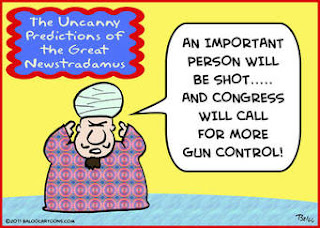“The fact that we live at the bottom of a deep gravity well, on the surface of a gas covered planet going around a nuclear fireball 90 million miles away and think this to be normal is obviously some indication of how skewed our perspective tends to be.” ― Douglas Adams
 |
| DAILY SPECIALS |
|
Big week on
opioids
|
|
There's a lot
going on this week in the House Energy and Commerce Committee's response to the
opioid crisis.
What's
happening:
More: The DEA on Friday suspended a wholesaler in
Louisiana over its handling of opioids, the first such move since 2012, per
the Washington Post. [Axios Vitals: Monday, May 7, 2018]
|
 |
| EPA |
 |
| BERNIE SANDERS |
NoRA: activists and stars launch gun
control campaign to battle NRA
|
|
No Rifle Association
Initiative unites Parkland students and celebrities including Alec Baldwin
and Amy Schumer
|
|
|
|
|
NoRA
A group of activists
and celebrities have launched a new campaign targeting the National Rifle
Association.
The No Rifle Association Initiative, backed by students from Marjory Stoneman Douglas high
school in Parkland, Florida – where 17 people were shot dead in February –
and celebrities including Alec Baldwin, Amy Schumer and Jimmy Kimmel, aims to
“shine a bright light on the bloody hands of the NRA and the politicians they
purchase”.
The move comes
as thousands of students walked out of classes on Friday, the 19th
anniversary of the Columbine shooting, calling for gun control reform.
|
|
|
|
|
|
NoRA says it will
mobilise people to vote out NRA-funded candidates in the November midterm
elections. Its website offers information on registering to vote and contacting lawmakers.
“We’re going to
plaster the nation with the faces of those who take NRA blood money with
posters created by iconic artist Bradley Theodore,” a statement said. “We’re
going to show up at the NRA convention in Dallas and make them wish they
stayed home. We might just sue the pants off the NRA.”
Florida survivor calls for boycott
The activist David
Hogg, one of the survivors of the Parkland shooting, has called for a boycott
of the investment companies BlackRock and Vanguard.
The companies are
“two of the biggest investors in gun manufacturers; if you use them, feel
free to let them know”, Hogg – who is writing a book, #NeverAgain: A New Generation
Draws the Line – wrote on
Twitter, posting the hashtags #boycottvanguard and #boycottblackrock. [The Guardian, April 21, 2018]
|
 |
| READ |
COMEY’S BOOK TOUR
The Trump administration sure does sell books.
The latest to cash in: former FBI Director James B. Comey, whose book “A Higher Loyalty” hit the stores this week and became an instant bestseller.
Comey launched his publicity tour for the book with an interview on ABC with George Stephanopoulos in which he likened Trump to a mob boss, calling him "morally unfit" for the presidency and a "stain" on those around him.
Trump suggested the former FBI chief should be imprisoned.
As Tanfani wrote, the extraordinary interview included Comey saying that he thinks it is possible that the president is in fact compromised by Russian intelligence.
Asked in the interview whether he thought Russia "has something" on Trump, Comey said: "I think it's possible. I don't know.”
Comey has taken fire from at least two directions. Trump’s allies call him a liar and accuse him of being out to get the president. And many Democrats can’t forgive Comey for the damage he did to Hillary Clinton’s campaign. Comey insists his actions were justified, which has incensed many Clinton supporters.
What impact will all this have politically? As usual, don’t count on a big swing in public opinion. Most Americans have very firmly held views about Trump. That’s especially true among those who oppose him.
Among Trump’s supporters, some back him fervently. But there’s a significant minority whose support is softer. The question will be, over time, whether Comey’s charges sway some of them.
So far, despite a few polls that seem to be outliers, Trump’s approval rating has barely budged up or down since the beginning of January. [LA TIMES, Essential Politics, April 20, 2018]
The latest to cash in: former FBI Director James B. Comey, whose book “A Higher Loyalty” hit the stores this week and became an instant bestseller.
Comey launched his publicity tour for the book with an interview on ABC with George Stephanopoulos in which he likened Trump to a mob boss, calling him "morally unfit" for the presidency and a "stain" on those around him.
Trump suggested the former FBI chief should be imprisoned.
As Tanfani wrote, the extraordinary interview included Comey saying that he thinks it is possible that the president is in fact compromised by Russian intelligence.
Asked in the interview whether he thought Russia "has something" on Trump, Comey said: "I think it's possible. I don't know.”
Comey has taken fire from at least two directions. Trump’s allies call him a liar and accuse him of being out to get the president. And many Democrats can’t forgive Comey for the damage he did to Hillary Clinton’s campaign. Comey insists his actions were justified, which has incensed many Clinton supporters.
What impact will all this have politically? As usual, don’t count on a big swing in public opinion. Most Americans have very firmly held views about Trump. That’s especially true among those who oppose him.
Among Trump’s supporters, some back him fervently. But there’s a significant minority whose support is softer. The question will be, over time, whether Comey’s charges sway some of them.
So far, despite a few polls that seem to be outliers, Trump’s approval rating has barely budged up or down since the beginning of January. [LA TIMES, Essential Politics, April 20, 2018]
 |
| TRUMP |
 |
| WHIMSEY |
 |
| U.S. MILITARY |
 |
| TECHNOLOGY |
 |
| THE NUCLEAR OPTION |
 |
| INDIGENOUS PEOPLES |
 |
| ENERGY |
100% Renewable Energy is Within Our Reach
The world cannot afford to
continue to rely on fossil fuels. Scientists now tell us that at current rates,
within a decade we'll likely have put enough carbon in the atmosphere to warm
the earth past the Paris climate targets. We are running out of time.
Cities and states around
America are already moving towards this goal. Countries around the world are
outpacing us: transport in the Netherlands is run increasingly on wind power,
Santiago's train system will run entirely on solar power soon, China can power
provinces the size of Texas for a week straight.
The technology to implement
100% renewables already exists and we have public opinion on our side. A
majority of Americans favor government action to increase the development of renewable
energy.
Corporate interests and
politics stand in our way. I know we can overcome them. We must.
Thanks for staying engaged,
Bill McKibben [Sanders
Institute, April 20, 2018]
THE ROOKIE: The
energy industry is unsure what to make of the relatively unknown Francis
Brooke , who will
soon replace Mike Catanzaro as the top White House energy aide. A 28-year-old
former baseball pitcher, Brooke spent the last year in Vice President Mike
Pence's office serving in a junior role to Catanzaro and George David Banks.
But Pro's Ben Lefebvre and Eric Wolff report energy lobbyists worry his
promotion could leave them without steady hands to steer the White House as big
decisions on the coal industry, biofuels and energy trade pile up - especially
in the crucial run-up to the midterm elections. "It shows you this
administration doesn't care about these issues," said one lobbyist who
works extensively with the administration on energy policy. "I expect
agencies are now going to have to play a bigger role. There's not going to be a
lot of policy issues that will be determined over the next eight months or
so." [POLITICO's Morning Energy, April 20, 2018]
WHAT'S THE HOLD UP? House Natural Resources Chairman Rob Bishop says a comprehensive GOP energy
bill is "being held up" until the Pentagon weighs how offshore
drilling near Florida could affect national security, following backlash from
the offshore proposal that led two Florida Republicans to pursue a permanent
moratorium. A pending
energy bill, H.R. 4239
(115) , is one
potential vehicle to extend that moratorium. Bishop told Anthony he is waiting for a Defense
Department report on how expanded drilling near Florida would affect
"mission compatibility." A committee spokeswoman said the results of
the study would help determine next steps on the moratorium. [POLITICO's
Morning Energy, April 20, 2018]
SPEAKING OF METHANE: Earlier this week BP released its "advancing the
energy transition"
report, committing to near-term carbon reductions and
setting a target methane intensity of 0.2 percent and holding it below 0.3
percent. The Environmental Defense Fund highlights the report Thursday in a post
arguing on the next frontier of methane targets, as annual shareholder
resolution meetings are on the horizon. [POLITICO's Morning Energy, April 20,
2018]
 |
| ELECTIONS |
|
 |
| WHITE HOUSE |
 |
| Russian interference in the 2016 election |
|
|
NOTE: The news sources here vary. Not all sources have the same credibility, but in an effort to share some different perspectives, they are included here. This compendium itself cannot claim to be unbiased. Please take into consideration where these different perspectives originate in assessing their value. Thank you
NOTE: I have no official connection to any organization from which information is shared.. Occasionally, I post informational material and/or an opportunity to donate or join as a "community service" announcement. These again are shared for their varying perspectives.
Any commercial or business interest information shared is purely informational, not an endorsement. I have no connection with any such commercial or business interest.
Any books listed are random or topic-related to something else in the post. Think of these as a "library bookshelf" to browse. They are shared for informational or entertainment value only, not as being recommended.







Comments
Post a Comment